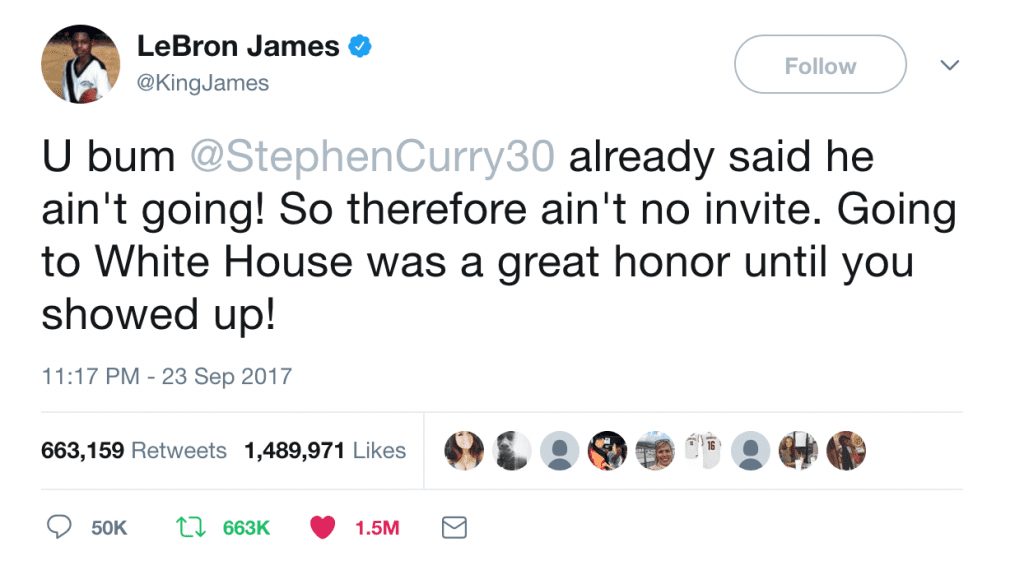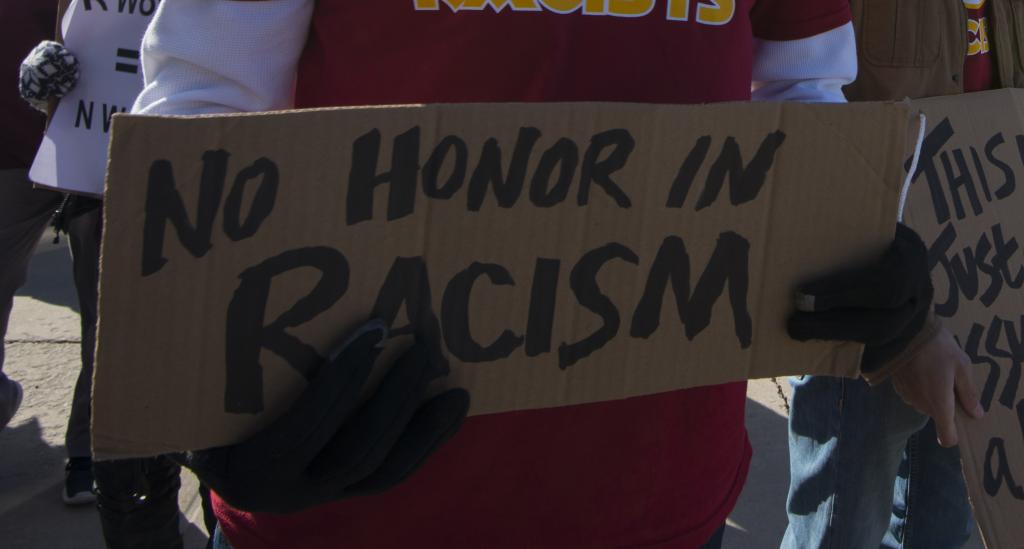Whoever said America was not an honor-shame society? Just this week, the President of the United States and LeBron “King” James exchanged barbs on Twitter that concerned whether being invited to the White House is an “honor.” Also, millions of Americans are incensed that NFL players expressed protest during the national anthem and so “disrespect” the flag and “dishonor” US soldiers.

What provokes so many people? They are not debating “legality” and absolute moral standards. Ultimately the hubbub is about collective identity. It’s about who and how someone honors or shames America.
What I don’t hear is a conversation about how Christians should respond. Should Christians be offended? Might Christians have the wisdom to offer amid the arguments?
This post explores these and other less asked questions. I’ll likely offend both sides, but that probably means I’m making sense. I first want to clarify a few honor-shame dynamics at work. As a result, we might be able to respond to the situation with wisdom.
People and the Power of Symbols
Want to know who you are? Take a look at what offends you. Especially look at the symbols in your life, whether your clothing or the national flag. For various reasons, many Americas underappreciate the significance of symbols and symbolic gestures (hence, the rise of l entertainment model churches and the belittling of sacred ordinances).
Ironically, both sides of the debate about kneeling during the anthem think they are honoring the what the flag represents. The symbol that should represent unity is dividing the country. Ironic. Why do symbols divide?
Symbols have honor (and thus can be disrespected) because of the narrative they imply. A common narrative is essential for collective unity. The problem of late is that Americans have divergent narratives with different protagonists.
Trump and others think the flag represents soldiers. This, of course, is a half-truth, which is eloquently addressed by Bob Costas in the video below.
Soldiers don’t die for flags
His comments perfectly capture an underlying problem with the popular narrative about the protests. Even within the Trump narrative, we mustn’t forget an essential point: Soldiers don’t die for flags.
Rather, they die for people and the principles that flags represent. One principle is the right to protest, even if you disagree with the issue at stake. By NFL players’ own account, they are protesting because they want to see American become better, to live up to its claimed ideals.

This is precisely why a 97-year-old WWII veteran kneeled in solidarity with protesters but for a different reason, saying, “Those kids have every right to protest.”
By contrast, protesters tell a different narrative. The flag represents all Americans (not only soldiers) and the right to publically express grievances that one thinks hurt the country. They ask, “Which honors the nation more? Standing for a flag or standing by its values?”
How aware are we of our collective narrative? Try identifying and explaining the symbols around you.
Popularity and Political Currency
I often say to people, “Learn from others’ mistakes so that you can make new mistakes.” Accordingly, let’s see what we can glean from President Trump’s own lack of wisdom in handling recent events.
Honor and shame are highly contextual. That is, honor depends on one’s social sphere. It is akin to social currency, being both limited and context specific. When Trump asserts himself within the sports world, he wrongly presumes that others will “give him face” simply because he is the President.
When he publically pouts about the opinion of a single athlete, Stephen Curry, by uninviting an entire team, he trivializes his own position and effectively brings shame to the Office. In a sense, he “lowers himself” by acting like the “rest of us.”
Trump does not understand that honor-capital is limited. One preserves honor by spending it less, i.e., by showing restraint. (Not even Jesus made everything a war)
Trump made Curry’s implicit honor challenge far more public. As a result, he magnified the weight of that challenge. Furthermore, by public shaming people who are publically respected, he compounds his own loss of face.
Provocation and Protesting with Honor
How might we need to respond to these events? Both Trump and the protesters have something in common. They emphasize what it permissible, right or wrong but do not consider what is most wise.
Wisdom requires that we distinguish what we do and how we do something. For instance, we should love everyone, but how we love individual people will differ. We should honor everyone (1 Pet 2:17). But how we do it make a big difference (cf. 1 Tim 5:17).
“The wise will inherit honor, but fools get disgrace.” (Prov 3:35)
“Like one who binds the stone in the sling is one who gives honor to a fool.” (Prov 26:8)
The key issue is not whether players have the right to protest. They do. Sadly, people are not outraged about the players’ specific concerns. There’s little constructive debate about the real issues. Why the communication problem?
How they protest distracts people from what they are protesting.
In effect, the protesters make a wound without a plan for healing. How so? Because kneeling before the flag is highly susceptible to misunderstanding and offense by far more people than have the power to actually change the problem.
The protesters do not have specific, concrete demands with defined measures of success within any achievable future. No foreseeable end exists to the protest. Protesting the existence of inequality, in general, is not sufficiently constructive since various sorts of inequality have and will always exist in some form.
If they protest unfair treatment by certain cops, then what are actionable policy changes that would amount to a victorious protest? In the heat of the moment, the protests will not stop a hasty cop who fears people of other ethnicities. Yet, the manner of protest continues to offend millions who can do little to nothing to rectify these social problems in any foreseeable future.
If the goal simply is “raising awareness,” then when do such highly offensive protests stop? Typically, awareness campaigns have well-defined limits (i.e., 1 month, once a year, etc.).
In short, protests without a purpose are mere provocation.
“Answer not a fool according to his folly, lest you be like him yourself. Answer a fool according to his folly, lest he be wise in his own eyes.” (Prov 26:4–5)
Unfortunately, the social narrative has now shifted from the important issues of race to whether people have a “right” to protest in this manner. This is a tragedy.
Honor Everyone
The Bible is not entirely silent. We often see instances where national loyalties muddied people’s perspective of truth. For example, Stephen’s accusers
“set up false witnesses who said,‘This man never ceases to speak words against this holy place and the law, for we have heard him say that this Jesus of Nazareth will destroy this place and will change the customs that Moses delivered to us.’” (Acts 6:13–14)
Jesus well grasped the importance of symbolism. But he also had a lot to say about people who honor symbols but forget their substance. Whatever the social significance of a symbol, Jesus saw the bigger issues at stake and people involved in a dispute.
We should honor everyone but not in every way.
The command to “honor everyone” applies even to the best and worst of society, to say nothing of those we simply disagree with. The emperor who Peter said to honor (1 Peter 2:17) was neither democratically elected nor just in his treatment of his subjects. Paul writes to Timothy,
“Let all who are under a yoke as bondservants regard their own masters as worthy of all honor, so that the name of God and the teaching may not be reviled.” (1 Tim 6:1)
What should motive our response to those whom we might regard as shameful? The desire to honor God’s name. Like Trump, we might sully the church’s reputation by overspending our (perceived or actual) social capital defending the honor of a mere flag rather than genuine injustice against people.
What does it say about those Christians who get so riled up about kneeling during the national anthem? Might they honor America more than Christ?
Perhaps. If so, that would be a shame.














